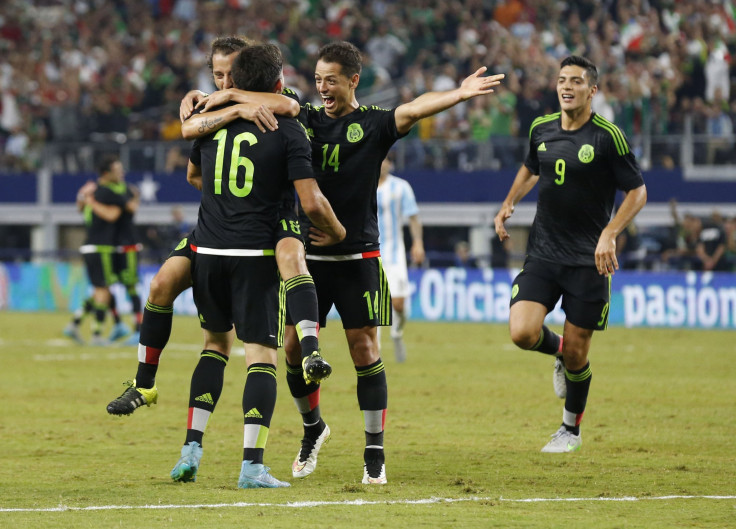Mexico vs. USA Soccer 2015: El Tri Favorites For Confederations Cup Playoff After Latest Friendlies?

While Mexico may be under the temporary charge of their fifth coach in two years, it is they, not the United States, which head into the sides’ Confederations Cup playoff next month with a greater sense of stability. Some late magic from Lionel Messi and Sergio Aguero magic prevented Mexico from garnering the bragging rights of a win over the world’s top-ranked team on Tuesday. But their performance against Argentina in just the second outing under interim coach Ricardo “Tuca” Ferretti provided much to encourage. In contrast, the U.S. suffered a chastening 4-1 defeat to Brazil as, despite entering his fifth year as coach, Jurgen Klinsmann’s latest experimentation again failed to bear fruit.
Much uncertainty has surrounded the identity of the man in the Mexican hot seat -- Ferretti’s reign is still scheduled to last just two more games -- but there is ever increasing scrutiny on Klinsmann. The German has been handed arguably more job security than any other national team coach on the planet, thanks to his long-term contract handed out before last year’s World Cup, which also made him the program’s technical director. Yet, although there has yet been no hint publicly that the commitment to the former Germany striker is wavering, he is a man undoubtedly under pressure to start delivering on his bold plans.
Throughout his reign, Klinsmann has focused on a long-term mission to turn the U.S. into a proactive team that can take the fight to the world’s best. Not only does that objective remain some way out of reach, but the desperate search for it has left his team lacking an identity and consistency.
Klinsmann had stated that the experimentation that had characterized his selections since the World Cup would take a rest for the focus of 2015 -- this summer’s Gold Cup. Instead the inexperienced duo of John Brooks and Ventura Alvarado were thrust into the center-back roles and repeatedly faltered during a poor tournament that ended with a semifinal exit and the country’s worst performance in the competition in 15 years.
Going into a tough challenge against Brazil, in its final outing before its biggest match of the year, Klinsmann again stated that this was no time for experimentation. Once again, he couldn’t resist. Alejandro Bedoya was deployed in a holding midfield role, which, after having been crudely exposed and then hauled off after 36 minutes, he admitted he hadn’t before played as a professional. Meanwhile, in defense, arguably the position where experience is most important, there was another new center-back partnership.
The good news is that there are fairly straightforward solutions the U.S. can take to give themselves a strong shot to extend their fine recent record over Mexico. A core of Omar Gonzalez, Matt Besler, Michael Bradley, Jermain Jones, Clint Dempsey and Jozy Altidore all playing in their best positions can get the job done. But whether Klinsmann will go with the tried and tested is a very different matter.
Going with the tried and tested is certainly what Ferretti did on Tuesday. The Tigres coach reverted to the 3-5-2 formation that served predecessor Miguel Herrera so well in the early part of his reign. And, after a shaky 3-3 draw with Trinidad and Tobago to begin his time in charge, Ferretti brought the big guns back into his lineup against the World Cup and Copa America runners-up.
The 36-year-old Rafael Márquez returned to marshal the defense, while the same trio that functioned so well at the 2014 World Cup -- José Juan Vázquez, Andres Guardado and Hector Herrera -- were reunited in midfield. More than that, though, there was a clear idea of what each player and the team as a whole was doing. Pressing Argentina furiously, led by the bright forward duo Javier “Chicharito” Hernández, El Tri displayed the same intensity when winning the ball back to repeatedly threaten their illustrious opponents on the counter attack. The score may have finished 2-2 after a rash of late substitutions, but it was arguably Mexico’s best performance since the World Cup. And the timing could hardly be better, as they try to beat their rivals to the north for the first time in more than four years.
All is not suddenly perfect, of course. Mexico has made a habit of playing to the level of its opposition in recent years, and its biggest struggles have come when attempting to break down teams who are happy to hang back in defense and wait to strike on the break. The U.S. will provide a very different test to Argentina.
And, given the ongoing saga over Ferretti’s decision to omit the Dos Santos brothers -- Giovani and Jonathan -- from his first squad, and Mexican soccer’s capacity to shoot itself in the foot, it would be foolhardy to get over confident about the team’s prospects in a month’s time. Still, contrary to logic and expectations, there can be little question that it is Mexico that will head to the Rose Bowl on Oct. 10 on a more positive footing.
© Copyright IBTimes 2024. All rights reserved.





















